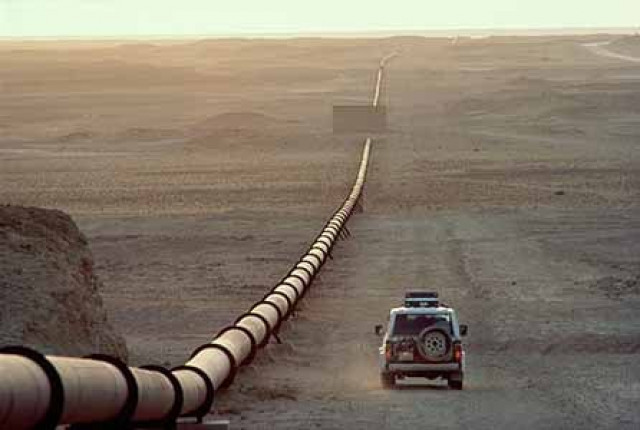Upset with tanker strikes, government plans to lay oil pipeline
Project will ensure smooth flow of oil across the country and curb theft

PHOTO: AFP
Strikes called by the oil tanker owners to press authorities to meet their demands as well as deadly tanker accidents have been a matter of grave concern for the government. Tanker owners and drivers have also been allegedly involved in oil theft at different depots of Pakistan State Oil (PSO) and power plants.
Kuwait agrees to build oil pipeline in Pakistan
In an attempt to ensure a smooth supply of oil and curb its theft, the Petroleum Division is planning to build an oil pipeline and wants to give the task to ISGS - a state-owned company - to invite investors interested in the project.
Since its creation, ISGS has been dealing with gas pipeline projects like Iran-Pakistan, Turkmenistan-Afghanistan-Pakistan-India (Tapi) and North-South gas pipelines.
According to experts, oil pipelines are a safer mode of transportation as an estimated $200 million worth of furnace oil is stolen every year during transportation through tankers.
In order to drum up support for the oil pipeline plan, the Petroleum Division has sent a summary to the ministries concerned to seek their comments before tabling it in an ECC huddle for approval.
Tariff for the pipeline will be determined through competitive bidding. The project will be executed in three phases based on the build-operate-transfer model with concession period spanning 15 years.
Building oil pipeline: Ministry considering floating tenders
Earlier, Pak-Arab Refinery (Parco) - a joint venture between Pakistan and Abu Dhabi - was offered to lay the oil pipeline, but it stayed away, arguing that the project was not financially viable because of expected low volumes.
Quoting an example, Parco management cited earlier endeavours on the part of PSO and Attock Refinery for building the pipeline, but the plan was abandoned due to less-than-required volumes. Parco was only interested in constructing the pipeline from Machike to Kharian as and when volumes are available. Shahid Khaqan Abbasi, who was petroleum minister at the time, asked officials if tenders could be invited to construct the pipeline.
At present, domestic refineries produce 13 million tons of petroleum products per annum against the demand for over 24 million tons. The balance is imported by PSO and private sector OMCs. Demand for petrol is growing at a pace of 20% and diesel at 10% per annum.
Published in The Express Tribune, August 22nd, 2017.
Like Business on Facebook, follow @TribuneBiz on Twitter to stay informed and join in the conversation.



















COMMENTS
Comments are moderated and generally will be posted if they are on-topic and not abusive.
For more information, please see our Comments FAQ